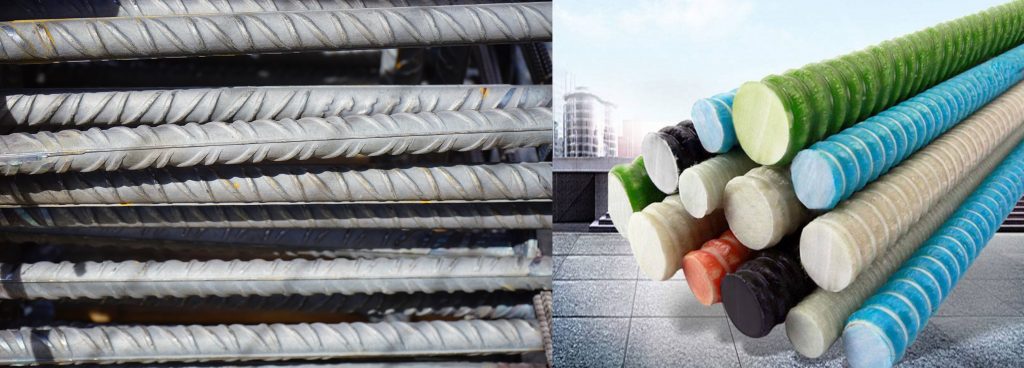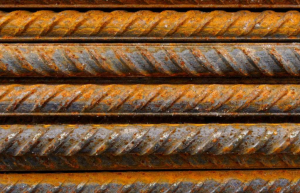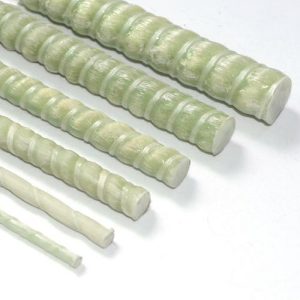- July 6, 2023
- Posted by: wellcoindustries
- Category: Rebar
When it comes to construction materials, rebar is one of the most crucial elements. Rebar is a reinforcement bar that is used to strengthen concrete structures, making them stronger and more durable. Traditionally, steel rebar has been the most common type of reinforcement used in construction projects. However, fiberglass rebar is becoming an increasingly popular alternative. In this article, Wellcoindustries will explore the differences between fiberglass rebar and steel rebar, and discuss which is the better choice for various construction projects.

Introduction to Rebar
Rebar is an essential component in concrete structures that helps to absorb the tensile stress that concrete structures are subjected to. It is a reinforcement bar that is made of steel, carbon, or fiberglass. Rebar is used to enhance the strength of concrete structures, such as bridges, buildings, roads, and other infrastructure. The use of rebar helps to increase the load-bearing capacity and durability of these structures.
Steel Rebar

Steel rebar has been used for decades in construction projects. It is made from carbon steel and is commonly available in diameters ranging from 6 mm to 40 mm. The surface of the steel rebar is usually ribbed to provide better adhesion to the concrete.
Advantages of Steel Rebar
- High tensile strength
- Durable and long-lasting
- Widely available
- Can be bent and cut to different shapes and sizes
- Easily welded to other steel components
Disadvantages of Steel Rebar
- Corrosion-prone
- Heavier than fiberglass rebar
- Susceptible to rust and decay over time
- Magnetic and can interfere with electrical components
Fiberglass Rebar

Fiberglass rebar is a relatively new material that is gaining popularity in the construction industry. It is made from glass fibers and is available in diameters ranging from 6 mm to 32 mm. The surface of the fiberglass rebar is usually smooth or lightly ribbed.
Advantages of Fiberglass Rebar
- Corrosion-resistant
- Lightweight
- Non-magnetic, making it ideal for use near electrical components
- Easy to cut and install
- Non-conductive, making it ideal for use in areas with high electrical activity
Disadvantages of Fiberglass Rebar
- Lower tensile strength than steel rebar
- More expensive than steel rebar
- Limited availability in certain regions
- May not be suitable for heavy-duty construction projects
Comparison Between Fiberglass Rebar and Steel Rebar
Strength and Durability
One of the most significant differences between fiberglass rebar and steel rebar is their strength and durability. Steel rebar has a higher tensile strength than fiberglass rebar, which makes it the preferred choice for heavy-duty construction projects. However, fiberglass rebar is corrosion-resistant and does not rust or decay over time, making it a better choice for structures that are exposed to harsh environmental conditions.
Weight
Another significant difference between fiberglass rebar and steel rebar is their weight. Fiberglass rebar is significantly lighter than steel rebar, making it easier to transport and install. This makes fiberglass rebar an ideal choice for projects where weight is a concern.
Cost
Cost is also a significant factor when choosing between fiberglass rebar and steel rebar. Fiberglass rebar is more expensive than steel rebar, making it a less attractive option for cost-sensitive projects. However, the increased durability and resistance to corrosion may make fiberglass rebar a more cost-effective option over the long term.
Which is Better: Fiberglass Rebar or Steel Rebar?
For heavy-duty construction projects that require high tensile strength, steel rebar is the preferred choice. However, for projects that require corrosion-resistant material, such as coastal structures or structures exposed to harsh chemicals, fiberglass rebar may be the better choice.
Fiberglass rebar is also an excellent choice for structures that are located near electrical components, as it is non-magnetic and non-conductive. It is also a good option for projects where weight is a concern, such as bridges or buildings located in earthquake-prone regions.
Ultimately, the choice between fiberglass rebar and steel rebar depends on the specific needs of the construction project and the budget. Both materials have their advantages and disadvantages, and it is up to the construction team to weigh the pros and cons and determine which material is the best fit for their project.
Conclusion
In conclusion, the use of rebar is crucial in enhancing the strength and durability of concrete structures. While steel rebar has been the traditional choice for decades, fiberglass rebar is gaining popularity as an alternative due to its resistance to corrosion and lightweight nature. Ultimately, the choice between fiberglass rebar and steel rebar depends on the specific needs of the construction project, and both materials have their advantages and disadvantages.
FAQs
- Is fiberglass rebar stronger than steel rebar?
- No, steel rebar has a higher tensile strength than fiberglass rebar.
- Is fiberglass rebar more expensive than steel rebar?
- Yes, fiberglass rebar is more expensive than steel rebar.
- Is fiberglass rebar suitable for heavy-duty construction projects?
- Fiberglass rebar may not be suitable for heavy-duty construction projects that require high tensile strength.
- Can fiberglass rebar be used in areas with high electrical activity?
- Yes, fiberglass rebar is non-magnetic and non-conductive, making it ideal for use in areas with high electrical activity.
- Which is better: fiberglass rebar or steel rebar?
- The choice between fiberglass rebar and steel rebar depends on the specific needs of the construction project, and both materials have their advantages and disadvantages.
